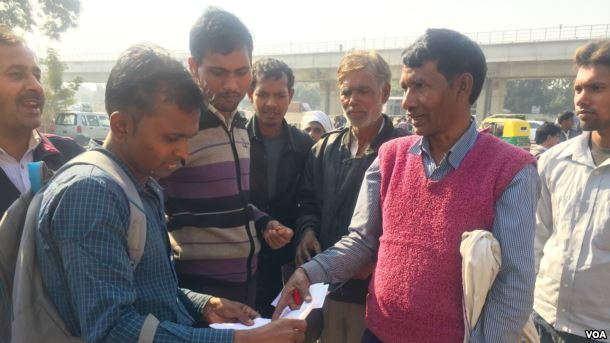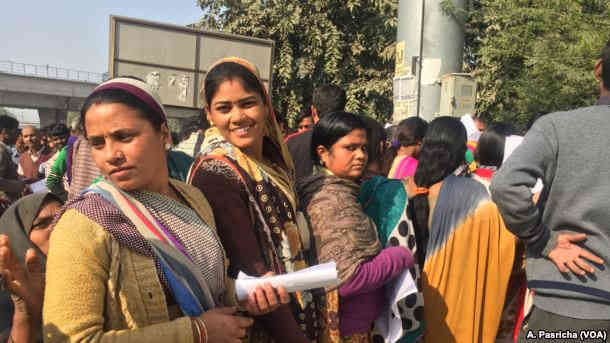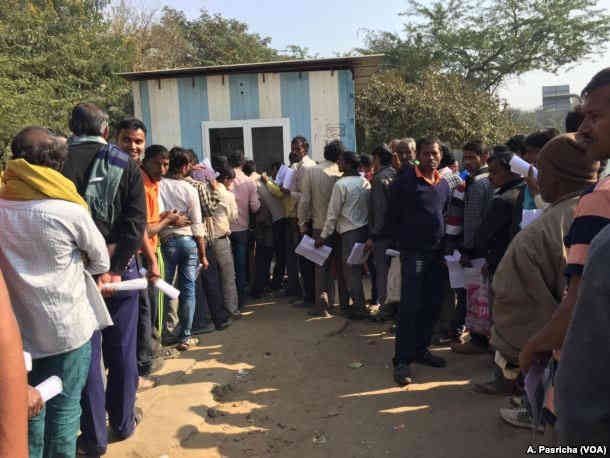Workers recently lined up outside a camp in northern India to open bank accounts.
The line formed at a traffic stop in the center of Gurgaon, in Haryana State.
One of the workers was Ishwari Lal, a daily wage laborer. He is like millions of migrant laborers across India. They work in small factories or businesses, at building projects, or as security guards, drivers and servants.
Lal’s wages were always paid in cash and he spent the money carefully. He sent some of it to his family. He used the rest to make rent payments for his one-room home and buy food or supplies.

But Lal has only been paid one-fourth of his wages since severe cash shortages began affecting the country. Six weeks ago, the Indian government banned high-value bank notes of 500 rupees ($7.50) and 1,000 rupees. The move was aimed at finding and seizing large amounts of illegal cash.
Lal’s employer asked him to put his wages in a bank. He is doing that now, but worries that getting the money back from the bank will be difficult.
Banks see shortage
Since the ban was announced, many Indians have stood in long lines at banks to get money. And, banks are not giving customers the amount they demand as the banks run out of money faster than it is replaced.
“If I need 10,000 rupees, I get 2,000 rupees. How can I manage in just this much money? I have faced massive problems,” Lal said. He wonders how he can buy food, pay for medicines, or send money home to his children.
Some employers are also facing cash shortages and [are] beginning to give out checks to pay wages.

In India, hundreds of informal sector workers are opening bank accounts. The informal sector is a part of the economy that is not taxed and not regulated by the government.
According to some estimates, nearly 480 million Indian nationals earn cash in the informal sector. That represents 80 percent of the country’s work force.
As the cash shortages continue, the informal sector is slowing down. This is affecting economic growth in one of the world’s fastest-growing economies.
Companies have reduced employees as business drops sharply and factories have laid off workers after having to slow down production.
Exodus of migrant workers
Wages are either not being paid on time or are being paid in old bank notes. This has led some migrant laborers in big cities to return to their villages. The ones who have stayed in cities are struggling to get paid.

Harsh Singh is a self-employed driver in New Delhi. Singh says he has not been getting calls from his regular riders since cash shortages began to get worse.
He said his work has decreased by at least 50 percent. And his passengers only make part of the payment. “So I have to go back to get my money,” he said.
He is thinking of opening a bank account to accept online payments, even if they sometimes amount to less than $10.
Several economists, however, say the currency ban will have good long-term effects. They say it help improve controls on small businesses and factories. And it will help bring poor people into the banking industry.
Millions in India have no ties to banks and cannot get financial services, credit or insurance.
Effect on Economic Growth
While it is too early to know the exact effect of the currency ban on economic growth, economist N.R. Bhanumurthy said informal jobs have suffered. He works at the National Institute of Public Finance and Policy
Bhanumurthy said there is an effect on the employment situation because of the general drop in economic activity. People are also spending less, but spending “is the biggest driver of (the) Indian economy,” Bhanumurthy pointed out.
But he expects this to be a short-term drop. He said that when spending returns, India may also see an increase in employment.
I’m Alice Bryant.
Anjana Pasricha reported this story for VOANews. Alice Bryant adapted it for Learning English. George Grow was the editor.
We want to hear from you. Write to us in the Comments Section.
_______________________________________________________________
Words in This Story
account – n. a record of money that has been paid and money that has been received
migrant – n. a person who goes from one place to another especially to find work
cash – n. money in the form of coins and bank notes
shortage – n. a state in which there is not enough of something that is needed
lay off – v. to end the employment of a worker or group of workers, usually because there is not enough work
currency – n. the money that a country uses
insurance – n. an agreement in which a person makes regular payments to a company and the company promises to pay money if the person is injured or dies, or to pay money equal to the value of something (such as a house or car) if it is damaged, lost, or stolen
customer – n. someone who buys goods or services from a business
regulate – v. to make rules or laws that control something
